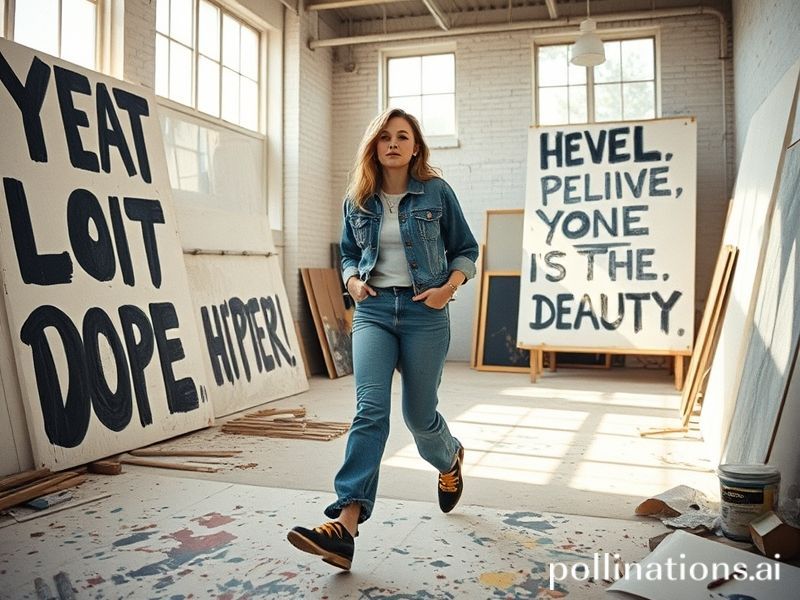Alexandra Grant: How One Multilingual Artist Became the World’s Most Unlikely Geopolitical Rorschach Test
From the moment the world learned that Keanu Reeves—patron saint of gentle memes, accidental fashion icon, and the only man who looks cool eating a sandwich on a bench—had a girlfriend, the international press corps pivoted with the precision of a Swiss watch. Suddenly, Alexandra Grant, an American artist who had spent two decades calmly building a multilingual, cross-continental practice, found herself trending between a K-pop comeback and a cryptocurrency crash. The planet’s attention span is famously that of a caffeinated fruit fly, yet Grant’s name ricocheted from Tokyo tabloids to Tunisian Twitter with the velocity of bad news about the euro.
Grant’s work, for those who bothered to look past the click-bait headlines, is essentially a love letter to translation. She paints, sculpts, and publishes in a pidgin of English, French, Spanish, and ancient Greek—languages whose native speakers have spent centuries politely trying to kill one another. Her large-scale canvases resemble blackboard fever dreams: looping text, erased and overwritten like diplomatic communiqués after one too many whiskies at a failed peace summit. For an era in which every public utterance is instantly weaponised—see also: Elon Musk’s midnight tweets and whatever the Kremlin’s fax machine coughs up—Grant’s palimpsests feel like a quiet act of sabotage against certainty itself.
Born in Fairview Park, Ohio, a town whose Wikipedia entry is shorter than the average haiku, Grant studied at Swarthmore and then bolted for the Old World like any sensible American with a passport and a mild allergy to exceptionalism. In Paris she learned that existentialism pairs well with red wine; in Berlin she discovered that reunification looks chic under sodium streetlights. By the time she returned to the States, she had accumulated the kind of cosmopolitan résumé that makes nationalist politicians break out in hives.
The Keanu Effect merely accelerated what was already happening: a growing recognition that Grant’s art is weirdly useful. Museums from Mexico City to Muscat have installed her textscapes in echoey atriums where schoolchildren on field trips can be confused in three languages at once. Collectors—many of them the same oligarchs who keep London property prices orbiting Neptune—now treat her pieces as hedges against both inflation and the collapse of meaning. Nothing says “diversified portfolio” like owning a canvas that literally reads “I forgot how to be lonely” in disappearing ink.
Meanwhile, the broader significance keeps ballooning. Grant’s nonprofit, grantLOVE, funnels money to arts education in Haiti, Kenya, and South-Central Los Angeles, operating on the radical premise that children everywhere deserve the tools to scribble subversion before adulthood installs the standard-issue cynicism patch. The grants are small, the bureaucracy minimal, the impact delightfully immeasurable—exactly the sort of inefficiency that drives the World Bank to drink.
Still, the global commentariat can’t quite decide whether Grant’s sudden fame is a feminist triumph or a Hollywood parable. To some, she’s proof that a 50-year-old woman can step onto the red carpet without being digitally sandblasted into a teenager. To others, she’s merely the latest exhibit in the museum of male celebrity plus accomplished-but-slightly-less-famous partner, right between Amal and George. The truth, as usual, is messier: fame is the world’s least efficient translation device, and nuance seldom survives the journey from artist to algorithm.
What remains is the art itself—stubborn, polyglot, and faintly amused by our collective need to caption everything. Somewhere in a storage unit in Beirut, rolled tight like a classified cable, waits a Grant canvas that says, “The map is a love letter the territory never answered.” One day it will be uncrated, mounted, and misinterpreted by a dozen tour guides in six languages. Until then, Alexandra Grant keeps working, keeps travelling, keeps crossing borders with the serene indifference of someone who knows that, in the end, every wall is just another surface waiting for a sentence.







